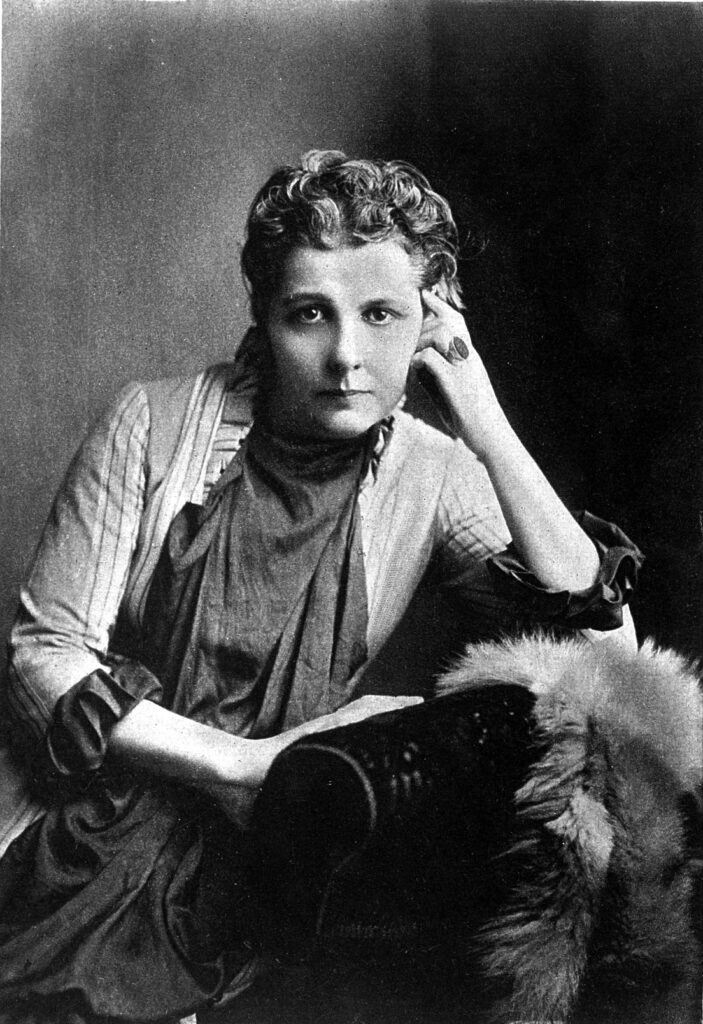Annie Besant was born on October 1, 1847, in London, England. Orphaned by her father at a young age and raised in modest circumstances, Annie showed early brilliance and independence.
At age 20, she married clergyman Frank Besant, but the rigid doctrines of the Church clashed with her free-thinking spirit. She soon separated from her husband, asserting her independence in Victorian England — a radical move for a woman of her time.
“No philosophy, no religion, has ever brought so glad a message to the world as this good news of Atheism.”
In her early years, she became a vocal atheist, joining the National Secular Society. She worked with Charles Bradlaugh, championing freedom of speech, women’s rights, and birth control.
They were even arrested for publishing a pamphlet on contraception — but public support led to their acquittal. This period shaped her belief in justice and truth, even when it was unpopular.
Turning to Theosophy and India
In 1889, Annie’s spiritual path took a dramatic turn. She discovered the Theosophical Society, founded by Helena Blavatsky.
Drawn to Eastern philosophies, karma, and reincarnation, Annie embraced theosophy wholeheartedly. She believed humanity was evolving spiritually and that ancient wisdom from the East held the key.
“Theosophy is not only a philosophy; it is a religion, a science, and an art.”
In 1893, she traveled to India for the first time and was profoundly moved. She felt a deep kinship with the Indian people and their spiritual heritage. Settling in India, she devoted herself to its education, spiritual revival, and eventually, freedom.
Championing Indian Independence and Education
Annie Besant became one of the earliest foreign-born leaders to fully champion Indian self-rule. She founded the Central Hindu College in Benares (now Varanasi), which later became Banaras Hindu University, one of India’s leading institutions.
“India is not a nation in the sense in which England is a nation. But India is a nation in the sense in which the European continent is a nation.”
In 1916, she launched the Home Rule Movement, demanding autonomy for India from British rule. Her fearless leadership led to her arrest in 1917. But the public uproar forced the British to release her.
That same year, she became the first woman President of the Indian National Congress, laying the foundation for the independence movement that would follow.
“Better remain silent, better not even think, if you are not prepared to act.”
Mentor, Mystic, and Visionary
Even as she fought for India’s political freedom, Annie remained a spiritual teacher. She mentored the young Jiddu Krishnamurti, whom she and the Theosophical Society initially believed to be a world teacher.
Though Krishnamurti later rejected this role, she continued to guide many on paths of inner exploration and moral development.
Annie Besant believed the soul’s freedom was as vital as the nation’s. In her final years, she spoke on global unity, spiritual progress, and moral awakening.
“Refuse to be ill. Never tell people you are ill; never own it to yourself. Illness is one of those things which a man should resist on principle.”
She passed away on September 20, 1933, in Adyar, India — her adopted homeland. Her ashes were scattered in the Ganges, a symbol of her enduring connection to the land and its people.
Legacy
Annie Besant was a woman far ahead of her time — an Englishwoman who fought for Indian independence, an atheist who turned into a spiritual seeker, and a reformer who stood for truth, justice, and universal brotherhood.
Her life was a mosaic of bold choices, self-transformation, and unwavering action. As she once said:
“Never forget that life can only be nobly inspired and rightly lived if you take it bravely and gallantly, as a splendid adventure in which you are setting out into an unknown country.”
Her efforts laid significant groundwork for future leaders like Mahatma Gandhi, and she is remembered as a bridge between Eastern philosophy and Western activism.
Her influence extended beyond politics into education, religion, and the promotion of interfaith understanding, making her one of the most impactful figures of her time.



The Indian Nation
“India is no less a nation because it has been subjugated. Nations are made by their people, by their culture, and by their enduring spirit, not by the chains of a foreign power. The glory of India is found in its ancient wisdom, its sages, and its scriptures, which have for millennia been the envy of the world. It is time for this nation, with its immense past, to awaken to its rightful future.
Self-government is not a privilege—it is the birthright of every people. India, with her teeming millions, has the capacity and the vision to govern herself. British rule must not be an eternal shadow over this land; instead, it must be replaced by the sunlight of liberty, shining equally upon all her sons and daughters.
But with freedom comes responsibility. To become a truly free Indian nation, we must rise above divisions of caste, creed, and religion. We are first and foremost Indians. Unity, above all, is the foundation upon which our nation can rebuild its grandeur.
Let us learn from our history and from each other, and let our voices call for Swaraj—self-rule—not with hate, but with justice and a steadfast commitment to the ideals of liberty and equality. Together, let us shape a future where India stands proud and independent, a beacon of peace and wisdom for the world.”

“Universal Invocation”
O Hidden Life, vibrant in every atom;
O Hidden Light, shining in every creature;
O Hidden Love, embracing all in Oneness;
May all who feel themselves as one with Thee,
Know they are therefore one with every other.
